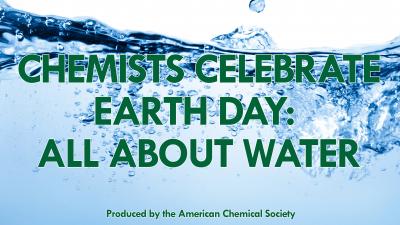Chemists celebrate Earth Day: Showcasing the scientists who keep our water safe (video)

Water is arguably the most important resource on the planet. In celebration of Earth Day, the American Chemical Society is showcasing three scientists whose research keeps water safe, clean and available for future generations. Geared towards elementary and middle school students, the "Chemists Celebrate Earth Day" series highlights the important work that chemists and chemical engineers do every day. The videos are available at http://bit.ly/CCED2014.
In celebration of Earth Day, the American Chemical Society (ACS) is showcasing three scientists whose research keeps water safe, clean and available for future generations. Geared toward elementary and middle school students, the “Chemists Celebrate Earth Day” series highlights the important work that chemists and chemical engineers do every day. The videos are available at http://bit.ly/CCED2014.
The series focuses on the following subjects:
- Transforming Tech Toys– Featuring Aydogan Ozcan, Ph.D., of UCLA: Ozcan takes everyday gadgets and turns them into powerful mobile laboratories. He's made a cell phone into a blood analyzer and a bacteria detector, and now he's built a device that turns a cell phone into a water tester. It can detect very harmful mercury even at very low levels.
- All About Droughts – Featuring Collins Balcombe of the U.S. Bureau of Reclamation: Balcombe's job is to keep your drinking water safe and to find new ways to re-use the water that we flush away everyday so that it doesn't go to waste, especially in areas that don't get much rain.
- Cleaning Up Our Water – Featuring Anne Morrissey, Ph.D., of Dublin City University: We all take medicines, but did you know that sometimes the medicine doesn't stay in our bodies? It's up to Anne Morrissey to figure out how to get potentially harmful pharmaceuticals out of the water supply, and she's doing it using one of the most plentiful things on the planet: sunlight.
The American Chemical Society is a nonprofit organization chartered by the U.S. Congress. With more than 161,000 members, ACS is the world's largest scientific society and a global leader in providing access to chemistry-related research through its multiple databases, peer-reviewed journals and scientific conferences. Its main offices are in Washington, D.C., and Columbus, Ohio.
To automatically receive news releases from the American Chemical Society, contact newsroom@acs.org.
Media Contact
More Information:
http://www.acs.orgAll latest news from the category: Life Sciences and Chemistry
Articles and reports from the Life Sciences and chemistry area deal with applied and basic research into modern biology, chemistry and human medicine.
Valuable information can be found on a range of life sciences fields including bacteriology, biochemistry, bionics, bioinformatics, biophysics, biotechnology, genetics, geobotany, human biology, marine biology, microbiology, molecular biology, cellular biology, zoology, bioinorganic chemistry, microchemistry and environmental chemistry.
Newest articles

Sea slugs inspire highly stretchable biomedical sensor
USC Viterbi School of Engineering researcher Hangbo Zhao presents findings on highly stretchable and customizable microneedles for application in fields including neuroscience, tissue engineering, and wearable bioelectronics. The revolution in…

Twisting and binding matter waves with photons in a cavity
Precisely measuring the energy states of individual atoms has been a historical challenge for physicists due to atomic recoil. When an atom interacts with a photon, the atom “recoils” in…

Nanotubes, nanoparticles, and antibodies detect tiny amounts of fentanyl
New sensor is six orders of magnitude more sensitive than the next best thing. A research team at Pitt led by Alexander Star, a chemistry professor in the Kenneth P. Dietrich…





















